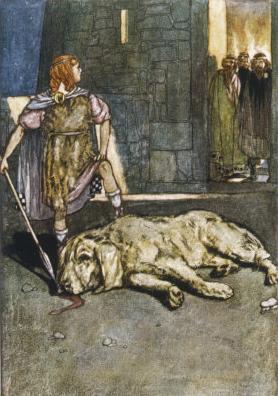Difference between revisions of "CuChulain and Adoption"
m (Admin moved page CuChulain to CuChulain and Adoption) |
m (→References) |
||
| Line 17: | Line 17: | ||
Cross, T.P., and Stover, C.H. Ancient Irish Tales. (Totowa: Barnes & Noble Books, 1988) | Cross, T.P., and Stover, C.H. Ancient Irish Tales. (Totowa: Barnes & Noble Books, 1988) | ||
Gantz, Jeffrey. Early Irish Myths and Sagas. (Harmondsworth: Penguin, 1981) | Gantz, Jeffrey. Early Irish Myths and Sagas. (Harmondsworth: Penguin, 1981) | ||
| − | "Encyclopaedia of the Celts: Cuchulain [et seq.]" Available at: | + | "Encyclopaedia of the Celts: Cuchulain [et seq.]" Available at: www.ealaghol.demon.co.uk/celtenc/celt_c6.htm and also at: www.ealaghol.demon.co.uk/celtenc/celt_c6b.htm |
[[Category: Adoption Celebrities]] | [[Category: Adoption Celebrities]] | ||
Latest revision as of 04:09, 26 February 2018
Biography
Also known as Setana
Irish hero figure and supreme champion of Ulster
Setana was the son of the god Lugh and the mortal Dechtire, wife of Sualtam. He had seven pupils in each eye and 14 fingers and toes. He was sent to be fostered by the best men in Ulster, according to ancient Irish custom. Like Heracles he was precociously strong. In one incident, aged six, he killed the ferocious guard dog of Culainn the blacksmith. In recompense he himself guarded the Culainn's forge until a new dog could be found, earning himself the name CuChulain (Culainn's Hound).
He mastered the javelin and hurley and the salmon-leap, and became a great warrior, whose fury in battle could only be cooled by being immersed in icy water three times or by being confronted by a legion of bare-breasted women. At 17 he fought the entire army of Connacht and her allies, but at 27 he was killed near Slieve Fuad by Lewy.
CuChulain corresponds to Gawain, Siegfried and Achilles in English, Germanic, and Greek tradition.
References
Leabhar na h-Uidhri = The Book of the Dun Cow, edited by R.I. Best and Osborn Bergin. (Dublin: Royal Irish Academy, 1929) Cross, T.P., and Stover, C.H. Ancient Irish Tales. (Totowa: Barnes & Noble Books, 1988) Gantz, Jeffrey. Early Irish Myths and Sagas. (Harmondsworth: Penguin, 1981) "Encyclopaedia of the Celts: Cuchulain [et seq.]" Available at: www.ealaghol.demon.co.uk/celtenc/celt_c6.htm and also at: www.ealaghol.demon.co.uk/celtenc/celt_c6b.htm
- Adoption Celebrities
- Adopted Persons
- Mythological, Traditional and Divine Figures
- European
- Britain
- Ireland
- Military and Defense
- Murdered, Assassinated
- Birth or Infancy
- To Further Family or Political Alliances
- Mother Married, but Not to Father
- Family Friends or Acquaintances
- Wealthy, Famous, Noble or Divine Adoptive or Foster Families
- Adoptees/Fosterees from Wealthy, Famous, Noble or Divine Birth Families
- Mother Married but Not to Birth Father
